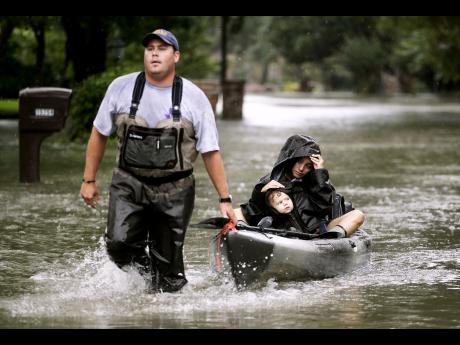Earth Today | Financing, capacity building among nation's priorities for 2017 climate talks
WITH THE devastation caused by hurricanes Harvey and others as the fuel, Jamaica is to continue its push for financing and other support to treat with loss and damage due to climate change events, at the annual climate talks set this year for Bonn, Germany.
"Nobody can tell the SIDS (small island developing states) that they should not fight for loss and damage. Go tell Barbuda to adapt now," said UnaMay Gordon, head of the Climate Change Division, alluding to the devastation caused on that island by Hurricane Irma.
"And look at Dominica," she added, noting the pummelling it received from Hurricane Maria.
Loss and damage, in the context of negotiations at the level of the United Nations Framework Convention on Climate Change (UNFCCC), arises where adaptation and mitigation efforts are not sufficient to treat with sudden or slow onset climate events, including extreme events, the likes of the hurricanes recently experienced, or prolonged droughts.
However, the issue proved, for a long time, contentious between developed and developing countries. This, with the concern of the former that they could potentially be held liable for damage caused by climate change and the stance of the latter that they should be given, among other things, their historical responsibility for climate change.
RESOLVED WITH PARIS AGREEMENT
That contention would seem to have been resolved with the 2015 Paris Agreement, which integrates loss and damage as an independent third pillar of the climate regime, in line with the lobby efforts of SIDS and other developing countries, while absolving developed countries of legal and financial obligations.
"It does so through dedicating and integrating the Warsaw International Mechanism [for loss and damage] into the long-term cooperative structure of the climate regime, cementing its role beyond 2016 and linking it to the institutional architecture of the Paris Agreement," explains a December 2015 ClimateFocus briefing note.
"The agreement further provides that the Warsaw Mechanism may be further enhanced and strengthened by the COP (Conference of the Parties to the UNFCCC), in its incarnation as the meeting of the parties to the Paris Agreement, creating a dynamic hook that enables loss and damage to continue to evolve in years to come," it added.
The agreement goes further to identify areas in which countries can "enhance understanding, action and support, including through the Warsaw International Mechanism, as appropriate, on a cooperative and facilitative basis with respect to loss and damage associated with the adverse effects of climate change".
These include early warning systems, emergency preparedness, comprehensive risk assessment and management, and risk insurance facilities, climate risk pooling and other insurance solutions.
REGIME OF THE EXTREME
Meanwhile, Jamaica, as other Caribbean SIDS, has support in its efforts to champion loss and damage.
"We seem to be entering into a new climate regime and we have to quickly begin to reckon with it. It is the regime of the extreme: extreme drought, extreme hurricane, extreme rainfall events. We are not used to dealing with this constant onslaught of extreme and so we need to think about it carefully," scientist Professor Michael Taylor said recently.
"The infrastructure will need to be designed to withstand the most intense category of hurricanes, and not only a one-off event, but a repeated onslaught. We really have, too, to look at this argument the Caribbean is making for loss and damage, because we are seeing the kind of total devastation taking place which is beyond the powers of any single government to put back together," he added.
Other issues to be championed by Jamaica at the upcoming talks, Gordon said, include:
- technology transfer, particularly as it concerns the implementation of Nationally Determined Contributions to the reduction of greenhouse gas emissions;
- capacity building for the conduct of greenhouse gas inventories;
- communication on adaptation; and
- gender and climate change.
All in all, Gordon said that the issues of SIDS do not change.
"Our national issues don't change. So it is an important COP for SIDS and, therefore, we are going to try to pull out all the stops to ensure the president of Fiji has our support," she said.
It is the first time that presidency of the COP is being held by a SIDS, in this instance, Fiji.


